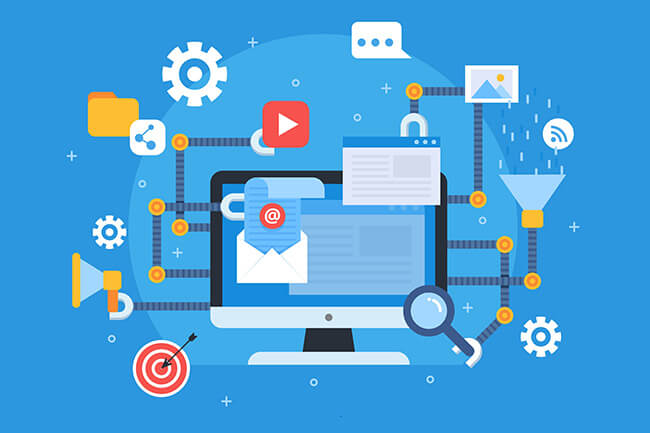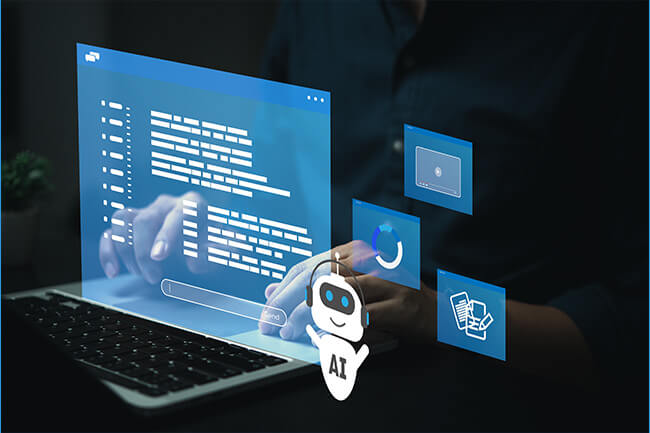B2B marketing automation revolutionizes marketing strategies through automated software platforms. It streamlines activities like lead generation, email marketing, and personalized content delivery. Statistics show that B2B organizations using automation generate twice as many leads and achieve an average ROI of $8.71 for every dollar spent.
By enhancing personalized experiences, marketing automation fosters and promotes customer engagement, resulting in long-term relationships. The global marketing automation market is projected to reach $8.42 billion by 2027, with a CAGR of 13.5%.
What Is Marketing Automation?
Marketing automation is when businesses and individuals alike use software and other technologies to automate and streamline marketing tasks and processes. This includes leveraging technology to execute repetitive and time-consuming activities such as lead nurturing, email marketing, social media management, customer segmentation, and campaign tracking.
By automating these processes, businesses can improve efficiency, save time and resources, and deliver personalized and timely communications to their target audience. Marketing automation enables marketers to optimize their marketing efforts, enhance lead generation and nurturing, and ultimately drive customer engagement and conversions.
Benefits of Implementing Marketing Automation in B2B
Here are a few benefits associated with the use of automation in marketing:
- Improved Efficiency and Productivity: Marketing automation streamlines and automates repetitive tasks. This reduces manual effort and frees up time for marketers to focus on strategic activities. By automating processes like lead nurturing, email campaigns, and customer segmentation, businesses can achieve higher efficiency, increase productivity, and scale their marketing efforts without a proportional increase in resources.
- Enhanced Lead Management and Nurturing: Marketing automation allows for effective lead management by capturing, tracking, and scoring leads based on their interactions and behaviors. This enables marketers to prioritize leads and deliver targeted, personalized content at different stages of the buyer’s journey. Through automated workflows and drip campaigns, marketing automation nurtures leads with relevant information, increasing the likelihood of conversion and driving higher-quality leads to sales teams.
- Personalization and Targeting: Marketing automation empowers businesses to deliver personalized experiences to their prospects and customers. By segmenting their audience based on various criteria, such as demographics, behavior, or purchase history, marketers can create tailored content and targeted campaigns that resonate with individual recipients. Personalization improves engagement, builds trust, and increases the chances of conversion, ultimately driving revenue growth.
- Data-Driven Decision Making: This technology provides valuable insights and analytics that help businesses make data-driven decisions. By tracking and analyzing key metrics, marketers can measure the effectiveness of their campaigns and identify areas for improvement.
- Sales and Marketing Alignment: By integrating with customer relationship management (CRM) systems, marketing automation provides visibility into lead interactions, enabling sales teams to access valuable information and engage with leads at the right time.
Understanding The B2B Customer Journey
The B2B customer journey begins with the awareness stage, where businesses conduct research and gather information about potential solutions and suppliers.
In the consideration stage, businesses evaluate different options and compare vendors based on features, benefits, pricing, and reputation.
During the decision stage, businesses narrow down their options and select a vendor based on factors such as pricing, contract terms, customization, and fit with their needs.
After the purchase, B2B marketers focus on post-purchase support, onboarding, and ongoing engagement to foster customer satisfaction and loyalty. This is why it is important to stay on top of B2B Latest Digital Marketing Trends.
Marketing Automation Tools and Its Implementation
Marketing automation tools are software platforms that enable businesses to automate and streamline marketing tasks and processes.
Here is a brief overview of marketing automation tool implementation:
- Tool Selection: Start by identifying your marketing goals, requirements, and budget. Research and evaluate the different marketing automation tools available in the market.
- Strategy Development: Outline your marketing automation strategy. Determine the key processes and tasks you want to automate, such as lead nurturing, email campaigns, or social media scheduling. Define your target audience segments and develop workflows or campaigns tailored to their specific needs and behaviors.
- Data Integration: Integrate your marketing automation tool with other systems, such as customer relationship management (CRM) software, to ensure seamless data flow and a unified view of your leads and customers. This integration enables better lead management, tracking, and personalized communication.
- Content Creation and Personalization: Create compelling content, such as email templates, landing pages, and forms, that aligns with your marketing objectives and audience preferences. Leverage the segmentation and personalization capabilities of the marketing automation tool to deliver tailored content and relevant messaging to different segments of your audience.
- Workflow Automation: Set up automated workflows or campaigns within the marketing automation tool. Define triggers, actions, and conditions to guide the flow of communication and engagement with your leads. This includes automated email sequences, lead scoring, behavior-based triggers, and dynamic content delivery.
- Testing and Optimization: Continuously monitor and analyze the performance of your automated campaigns. Test different variations of your messaging, subject lines, and calls-to-action to optimize your results. Leverage the reporting and analytics features of the marketing automation tool to gain insights into campaign effectiveness, conversion rates, and return on investment.
- Training and Team Adoption: Provide training and support to your marketing team to ensure they understand the tool’s features and capabilities. Encourage collaboration and knowledge sharing within the team to maximize the benefits of marketing automation implementation.
B2B Marketing Automation Strategies
- Marketers can use marketing automation tools to segment their audience based on various criteria, such as demographics or behavior, allowing for personalized and targeted messaging.
- These tools enable lead nurturing by delivering relevant content at different stages of the buyer’s journey, based on the actions and interests of prospects.
- Marketing automation also provides analytics and insights to measure the effectiveness of campaigns, track key performance indicators (KPIs), and make data-driven decisions for optimization.
- Successful implementation requires alignment between marketing and sales teams, ensuring a seamless handoff of leads, and leveraging automation to support the sales process.
- Ongoing monitoring, testing, and refining of automated workflows are essential to ensure optimal performance and adapt to evolving customer needs and market dynamics.
- It is important to prioritize data privacy and compliance when implementing marketing automation, adhering to relevant regulations, and obtaining necessary consents for data collection and processing.
- Training and continuous learning are crucial for marketers to maximize the benefits of marketing automation tools, staying updated on new features and best practices to drive effective campaigns and achieve desired outcomes.
Challenges in Marketing Automation
- Data quality, integration, and complexity of implementation pose challenges in marketing automation.
- Creating personalized content and aligning marketing and sales teams can be difficult.
- Measuring ROI, managing change, ensuring compliance, and scaling the automation process also present challenges.
Future Trends in Marketing Automation For B2B
- Future trends in B2B marketing automation include AI integration for advanced analytics and personalization, voice and chatbot automation, and the adoption of account-based marketing (ABM) at scale.
- Data privacy and compliance measures will become increasingly important, while omnichannel marketing automation, integration with customer experience (CX) platforms, and data-driven insights will enhance customer engagement and decision making.
- The expansion of automation capabilities, such as video marketing automation and AI-powered content generation, will further streamline B2B marketing processes and drive impactful campaigns.
Takeaway Notes
Marketing automation in B2B, particularly when managed by a digital marketing agency, streamlines marketing activities like lead generation and email marketing, bringing benefits such as efficiency, enhanced lead management, personalized targeting, data-driven decision making, and better alignment between teams.
Challenges include data quality, implementation complexity, content creation, alignment, ROI measurement, change management, deliverability, and scalability. Future trends involve AI integration, voice/chatbot automation, ABM, data privacy, omnichannel automation, CX integration, data-driven insights, and expanded capabilities.





Tell us your thoughts in the comments